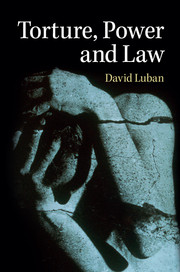Book contents
- Frontmatter
- Dedication
- Contents
- Preface
- Acknowledgments
- I Downgrading rights and expanding power during post-9/11 panic
- II The ticking bomb as moral fantasy and moral fraud
- III The evils of torture
- 5 A communicative conception of torture
- 6 Human dignity, humiliation, and torture
- 7 Mental torture: a critique of erasures in US law
- IV Complicity in torture
- Main index
- Index of legal authorities
- References
6 - Human dignity, humiliation, and torture
Published online by Cambridge University Press: 05 September 2014
- Frontmatter
- Dedication
- Contents
- Preface
- Acknowledgments
- I Downgrading rights and expanding power during post-9/11 panic
- II The ticking bomb as moral fantasy and moral fraud
- III The evils of torture
- 5 A communicative conception of torture
- 6 Human dignity, humiliation, and torture
- 7 Mental torture: a critique of erasures in US law
- IV Complicity in torture
- Main index
- Index of legal authorities
- References
Summary
This chapter originated as a lecture on Jewish ethics, in a series honoring the late philosopher Isaac Franck. My own writing has been almost entirely secular, and I am not a scholar of Jewish philosophy. Nevertheless, I have come to realize from the smatterings of Jewish law I have studied that my approach to many issues is very close in spirit to some central themes in Jewish ethics. This is specifically true of one of my themes in the present chapter, the central ethical importance of respecting human dignity by not humiliating people – a theme, as I hope to show, that similarly occupies pride of place in rabbinic ethics. The particular context for my argument is a subject of surpassing current importance: the torture and degradation of detainees by the US government in the “war on terrorism.”
Eleanor Roosevelt’s tea party
I begin with a famous story, almost a parable, about the drafting of the Universal Declaration of Human Rights (UDHR) – the first and most influential document for the contemporary human-rights movement worldwide.
- Type
- Chapter
- Information
- Torture, Power, and Law , pp. 137 - 152Publisher: Cambridge University PressPrint publication year: 2014



